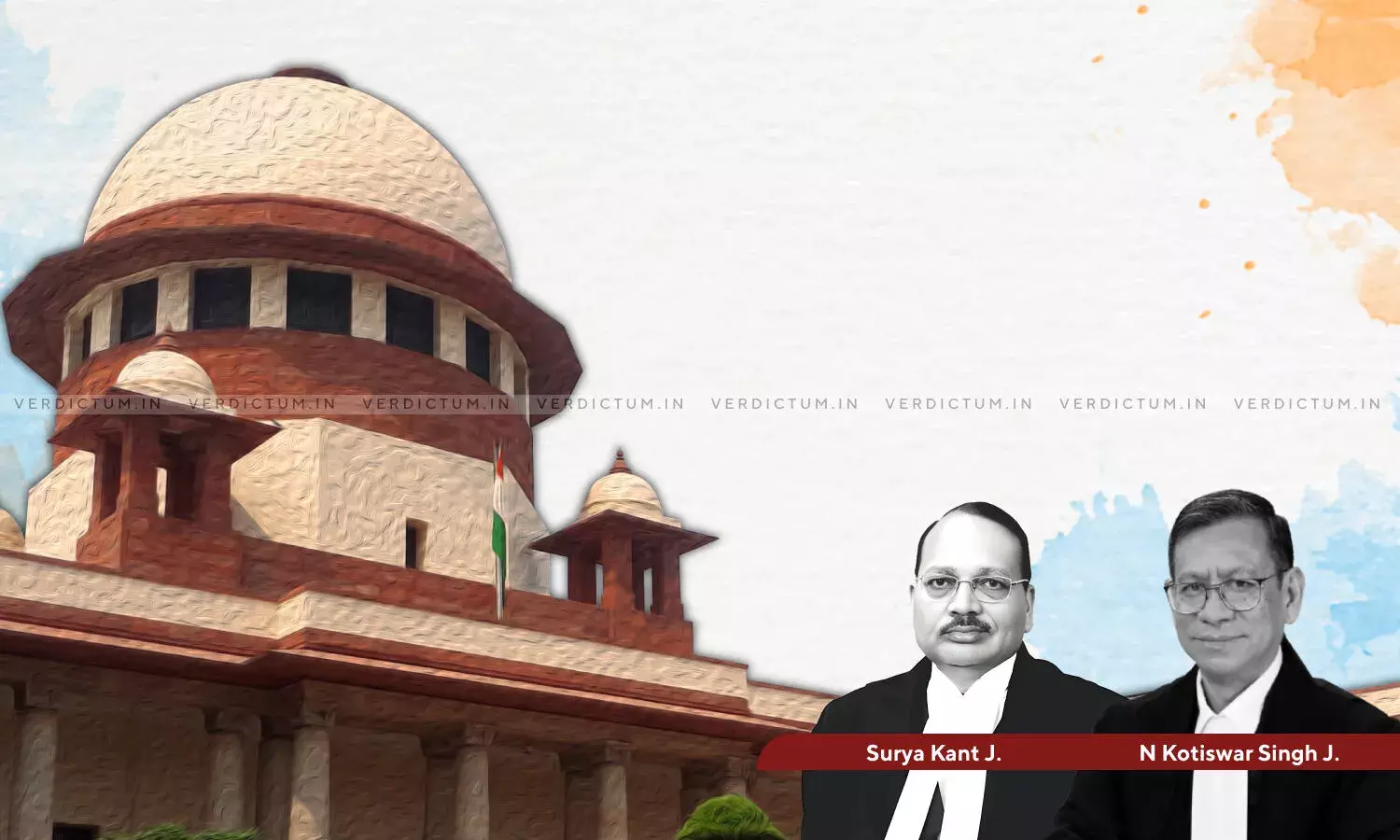Supreme Court: High Time That Arbitration Clauses Are Worded With Piercing Precision & Clarity; Not Couched In Ambiguous Phraseology
The Supreme Court had to determine whether the clauses within multiple Concession Agreements between the parties constituted an ‘arbitration clause’ or merely prescribed mediation.

Justice Surya Kant, Justice Nongmeikapam Kotiswar Singh, Supreme Court
The Supreme Court has stated that arbitration clauses must be worded with piercing precision and clarity and not couched in ambiguous phraseology.
The Court advised the legal fraternity against engaging in such practices, resulting in a “criminal wastage of precious judicial time.” The Court remarked, “Indeed, their professional credentials will not earn any stripes if they indulge in such juggling of words.”
A Bench of Justice Surya Kant and Justice Nongmeikapam Kotiswar Singh held, “This willful and wanton wastage of judicial time is similarly a practice that is highly deplorable, to say the least. It is high time that arbitration clauses are worded with piercing precision and clarity, and that they are not couched in ambiguous phraseology. This is a responsibility and onus that every legal counsel, advisor, and practitioner must shoulder most dutifully. We would, in fact, take this opportunity to advise, if not caution and warn, the legal fraternity against engaging in such practices which result in a criminal wastage of precious judicial time. Indeed, their professional credentials will not earn any stripes if they indulge in such juggling of words.”
Senior Advocate Nakul Diwan represented the Appellant, while AOR Sandeep Devashish Das appeared for the Respondent.
Brief Facts
The Court had to determine whether the clauses within multiple Concession Agreements between the parties constituted an ‘arbitration clause’ or merely prescribed mediation.
Court’s Reasoning
The Supreme Court held, “Equally, the Courts or judicial fora of our country—as a matter of judicial best policy—must show an unwavering tendency towards rejecting shoddily drafted clauses at the very threshold. Such cases, which prima facie disclose mala fides woven into the very Agreement they seek adjudication over, must be thrown out of the Court, as they have been indulged for far too long. We would complementarily urge the Courts to invoke their suo moto powers in appropriate cases wherein legal firms or counsel are found designing ‘arbitration clauses’ which deliberately mislead and misguide.”
“As the facts of these appeals clearly illustrate, the drafting of arbitration clauses in commercial agreements in India leaves much to be desired. Despite arbitration being introduced as a means of ensuring speedy and effective dispute resolution, it is evident and ironic that, in certain cases, the process has been misused to further complicate and prolong the resolution of disputes. The manner in which ambiguity is embedded into such agreements raises serious concerns. Whether this stems from administrative oversight or deficient legal advice is a matter best left for separate consideration,” the Bench stated.
“What is most shocking to our judicial conscience is the incontrovertible reality that the parties in the present cases have spent nigh a decade acrimoniously litigating over the method of dispute resolution itself, while their actual qualms against each other remain deeply buried under the surface—effectively stuck in limbo. A legal dispute that lingers for years over the mere mode of adjudication, before even touching the merits, is akin to a traveller stranded at a crossroads, endlessly debating which path to take while the journey itself remains unbegun. Justice, like the destination, recedes further into the horizon, not for lack of resolution but for want of a decision on how to resolve,” the Court remarked.
Consequently, the Court ordered, “The time is not far when personal liability must be assigned for such unscrupulous acts, along with the sanctioning of the harshest punitive measures against the actors. We are confident that these steps are vital to infuse probity, transparency, and professionalism into Indian arbitration. Needless to say, to uphold the integrity of the arbitral process, the sanctity of such agreements must be preserved.”
Accordingly, the Supreme Court disposed of the Appeal.
Cause Title: South Delhi Municipal Corporation of Delhi v. SMS Limited (Neutral Citation: 2025 INSC 693)
Appearance:
Appellant: Senior Advocate Nakul Diwan; AOR Umesh Kumar Khaitan and Praveen Swarup; Advocates Deepak Khurana, Abhishek Bansal, Pragyan Mishra, Devesh Maurya and Pareena Swarup
Respondent: AOR Sandeep Devashish Das, Praveen Swarup and Farrukh Rasheed

